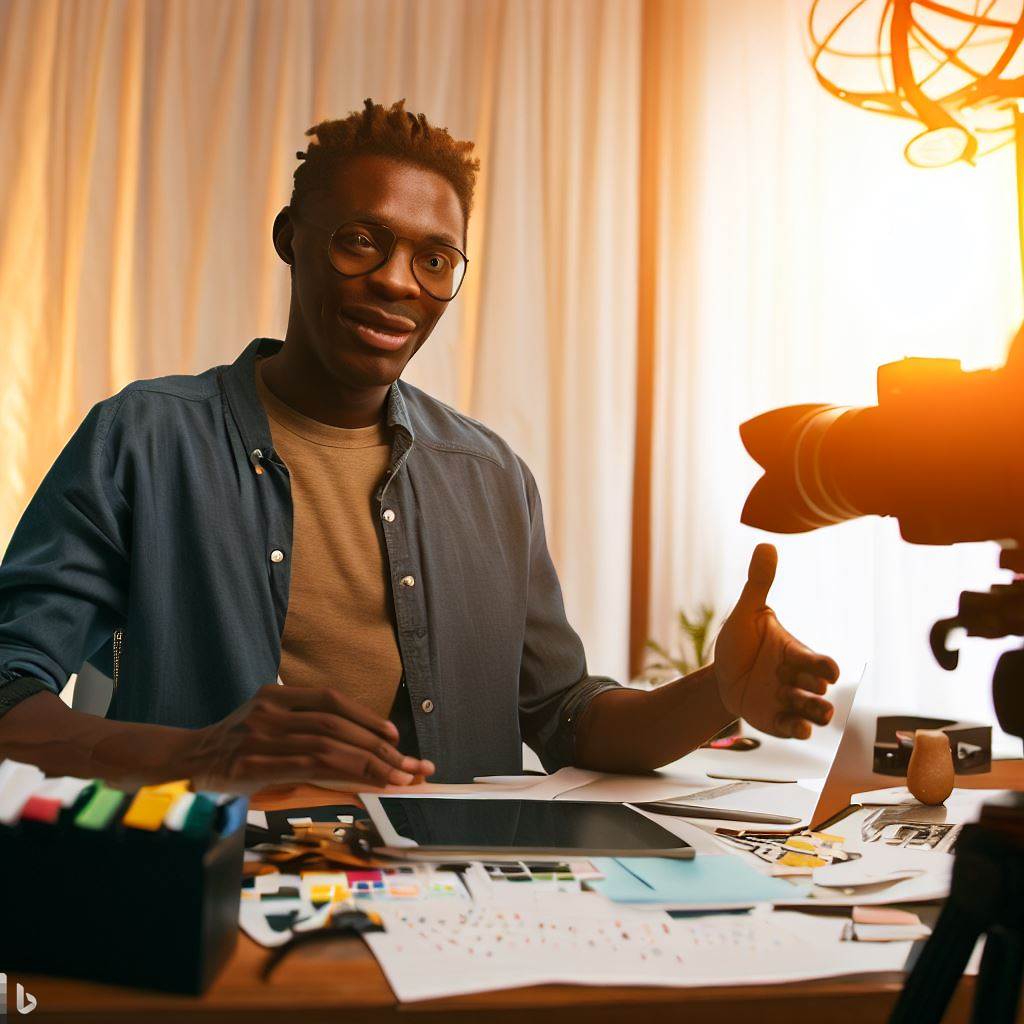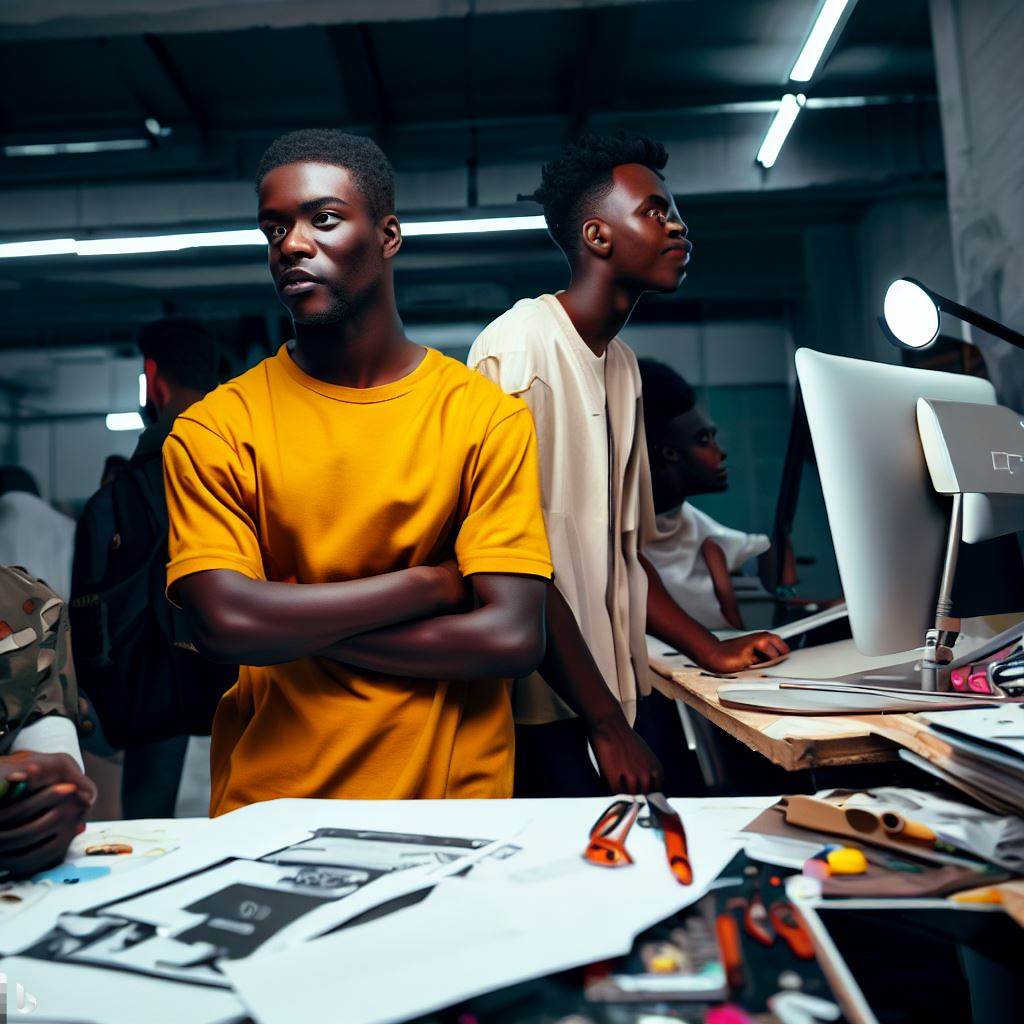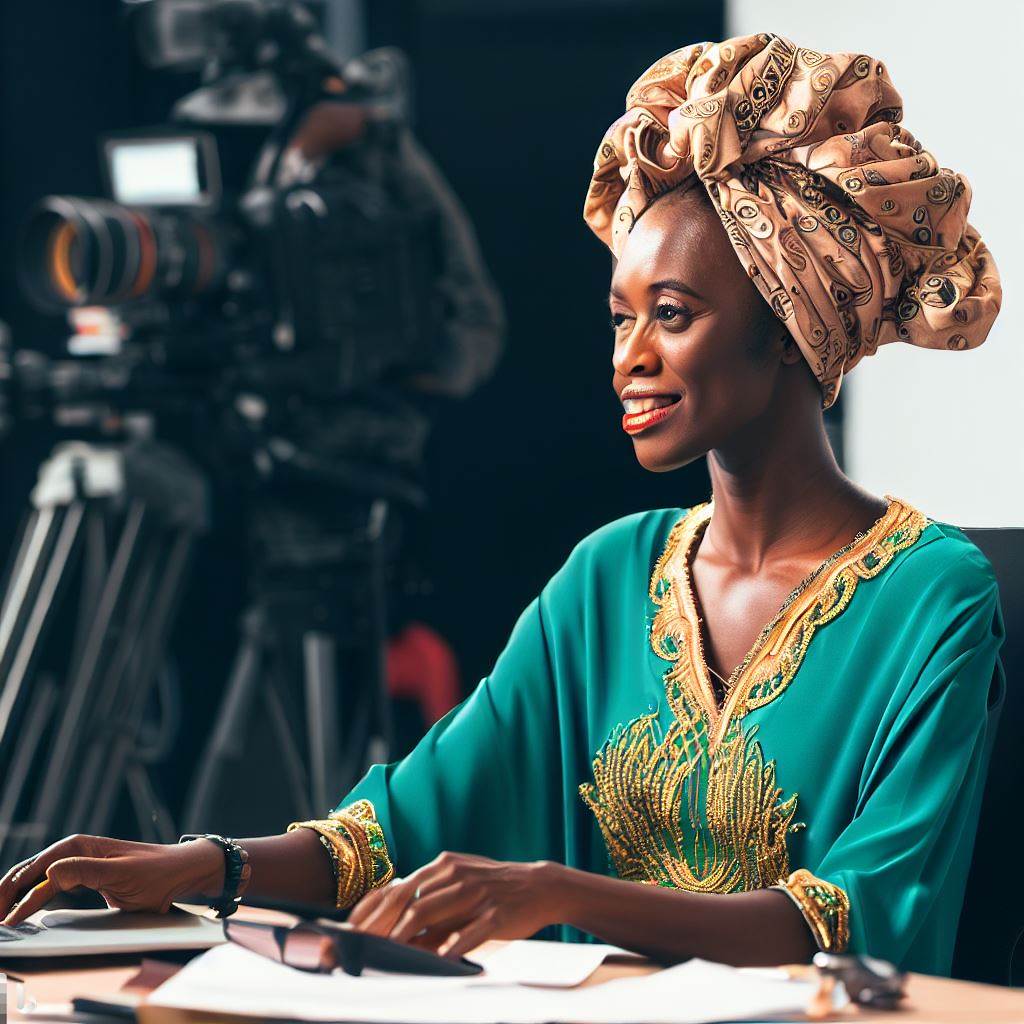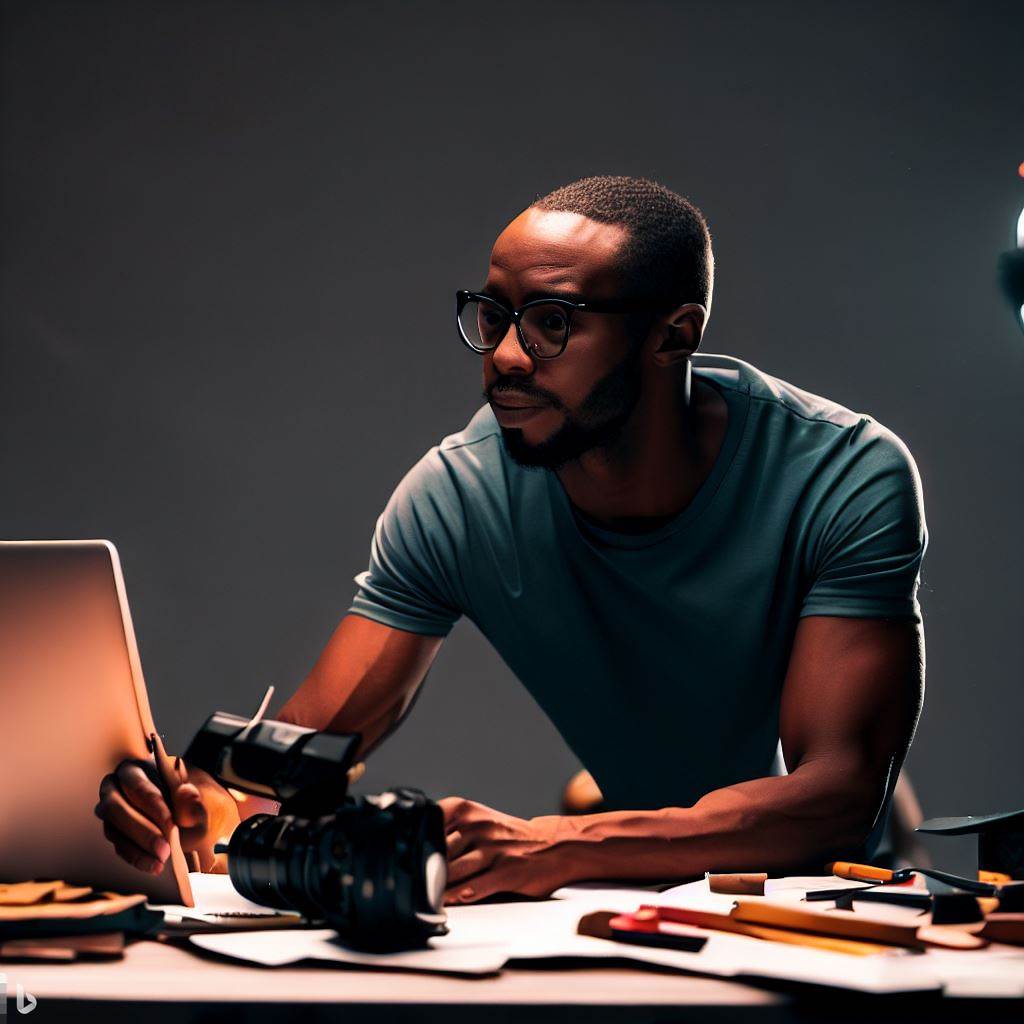Introduction
Becoming a production designer in Nigeria is an exciting and challenging career path.
In the Nigerian film industry, production design plays a crucial role in creating realistic and visually appealing sets that enhance storytelling.
introduction to Production Design in Nigeria
- Crafting Visual Stories: Production design in Nigeria is a vital aspect of filmmaking, shaping captivating visual narratives.
- Creating Realism: Production designers transform blank canvases into authentic worlds, enhancing storytelling and viewer immersion.
- Nurturing Talent: Nigeria’s film industry, Nollywood, seeks skilled production designers to elevate its global standing.
- Career Prospects: Aspiring production designers have vast opportunities to contribute to Nigeria’s burgeoning film industry.
- Cultural Significance: Production design showcases Nigeria’s diverse culture, fostering pride and recognition on the international stage.
- Economic Impact: The industry’s growth generates jobs and bolsters Nigeria’s economy, making production design a valuable profession.
Stay tuned for the upcoming chapters, where we explore the educational paths, skills, and steps required to become a successful production designer in Nigeria.
What is a production designer?
A production designer is responsible for creating the visual concept of a film, including sets, costumes, and props.
Role and responsibilities of a production designer
- Collaborating with the director and cinematographer to understand the vision and style of the film.
- Conducting extensive research to develop a thorough understanding of the film’s time period, location, and theme.
- Creating concept art, storyboards, and mood boards to visually communicate the design ideas.
- Designing sets, including the construction, decoration, and arrangement of the physical space.
- Selecting and sourcing props that enhance the narrative and aesthetic of the film.
- Working with costume designers to create visually cohesive and authentic costumes for the characters.
- Managing the art department, including hiring and supervising painters, carpenters, and other crew members.
- Collaborating with visual effects artists to integrate practical and digital elements seamlessly.
- Ensuring that the production design supports the storytelling by creating a believable and immersive world.
- Adapting the design to the budgetary constraints and production schedule.
Importance of production design in creating a visually appealing film
- Establishing the film’s visual identity: The production design sets the tone, style, and atmosphere of the film, helping to create a unique visual identity that enhances the storytelling.
- Enhancing the storytelling: The production design elements, such as sets, costumes, and props, contribute to the narrative by reflecting the characters’ personalities, the film’s themes, and the overall mood.
- Creating a believable world: Through meticulous attention to detail, a production designer can create a realistic and immersive world that transports the audience into the story.
- Setting the mood and tone: The production design choices, such as color palettes, lighting, and textures, can evoke specific emotions and enhance the desired mood and tone of the film.
- Supporting character development: The design elements help define the characters by visually representing their backgrounds, social status, and personal tastes.
- Enhancing visual storytelling: Production design can be used to guide the audience’s attention, highlight important elements, and visually communicate information that might not be explicitly stated in the dialogue.
- Differentiating the film: A visually striking production design can make a film stand out, leaving a lasting impression on the audience.
By understanding the role and responsibilities of a production designer, as well as the importance of production design in creating a visually appealing film, aspiring production designers in Nigeria can develop their skills and pursue a successful career in the industry.
Read: Commercial Photography in Nigeria: Business Opportunities & Growth
Skills and Qualifications
To become a production designer in Nigeria, several skills and qualifications are necessary.
These include:
- Creative Eye: A production designer must have a keen sense of creativity to bring the director’s vision to life on screen.
They need to be able to conceptualize and design sets, props, and costumes that align with the overall aesthetic of the production. - Attention to Detail: Being detail-oriented is crucial for a production designer.
They must focus on every aspect of the set design, ensuring that even the smallest elements are cohesive and contribute to the storytelling. - Technical Knowledge: A solid understanding of technical aspects such as lighting, color theory, and spatial composition is essential.
This knowledge helps production designers make informed decisions that enhance the visual appeal and mood of the production. - Communication Skills: Effective communication is vital as production designers collaborate with directors, artists, and other departments.
They must be able to articulate their ideas, understand the requirements, and work collaboratively to achieve the director’s vision. - Problem-Solving Abilities: Production designers often face challenges during the design and execution of sets.
They need to think quickly and come up with practical solutions to overcome obstacles within the constraints of time and budget. - Flexibility and Adaptability: Production designers should be flexible to accommodate changes that may arise during pre-production or on set.
They need to adapt to new ideas, budgetary restrictions, and unexpected situations while maintaining the visual integrity of the production.
Educational paths and courses that can help aspiring production designers include
- Bachelor’s Degree in Production Design: Pursuing a formal education in production design or a related field provides a strong foundation.
Courses cover various aspects such as art history, set design, costume design, and visual storytelling. - Fine Arts or Design Programs: Degrees in fine arts or design disciplines like graphic design, architecture, or interior design can also be beneficial.
These programs develop artistic skills, spatial understanding, and design principles applicable to production design. - Film or Theater Programs: Enrolling in film or theater programs introduces aspiring production designers to the specific requirements of the entertainment industry.
These programs cover topics such as film history, stagecraft, production management, and script analysis. - Internships and Work Experience: Gaining practical experience through internships or assisting experienced production designers can be invaluable.
It provides opportunities to learn on-set procedures, understand production requirements, and build a network in the industry. - Continuing Education and Skill Development: Staying updated with the latest technology, industry trends, and design techniques is crucial.
Attending workshops, seminars, and online courses can help enhance skills and expand knowledge.
Therefore, becoming a production designer in Nigeria requires a combination of creativity, attention to detail, technical knowledge, and effective communication.
Pursuing a relevant educational path and gaining practical experience will lay a strong foundation for a successful career in production design.
Read: Portraits in Nigeria: Connecting Culture and Photography
Building a Portfolio
Having a strong portfolio is of utmost importance for a production designer in Nigeria.
It serves as a visual representation of their skills, creativity, and ability to bring stories to life through design.
The Significance of a Strong Portfolio
- A strong portfolio showcases the production designer’s talent and expertise, making them stand out to potential employers and collaborators.
- It serves as a tool to demonstrate experience and competence in different aspects of production design, including set design, color palette, props, and costumes.
- A well-curated portfolio can help secure job opportunities, whether in the film industry, advertising, theater, or events.
- It provides evidence of the production designer’s ability to work within budgets, meet deadlines, and adapt to diverse project requirements.
- A strong portfolio helps build a reputation and can lead to recommendations and referrals from satisfied clients and collaborators.
Ways to Build a Portfolio
Building a portfolio requires a combination of hands-on experience, creativity, and collaboration with other filmmakers.
Here are some methods:
- Work on student films: Collaborating on student films provides practical experience and allows budding production designers to showcase their skills.
- Independent projects: Taking up independent projects, such as short films or documentaries, offers creative freedom and the opportunity to experiment with different design styles.
- Collaborate with other filmmakers: Partnering with directors, cinematographers, and editors on their projects helps expand the production designer’s network and broadens their portfolio.
- Volunteer for community events or theater productions: Contributing to local events and theater productions can showcase versatility and ability to adapt design to various contexts.
- Participate in design competitions: Competitions provide valuable experience and exposure, allowing production designers to push their creative boundaries.
Showcasing a Diverse Range of Work
While building a portfolio, it is crucial to showcase a diverse range of work to demonstrate adaptability and versatility in design.
This can be achieved by:
- Including samples from different genres and styles, such as drama, comedy, fantasy, or historical films.
- Highlighting unique design elements that set apart each project, such as creating distinct visual identities for characters or environments.
- Showcasing the ability to work with various budget constraints and still deliver visually stunning results.
- Presenting before-and-after images to showcase the transformation of spaces through the production designer’s creative vision.
- Including sketches, mood boards, and concept art to provide insight into the creative process and attention to detail.
In review, a strong portfolio is crucial for a production designer in Nigeria to showcase their skills, attract potential clients and collaborators, and establish a reputable presence in the industry.
By actively seeking diverse work experiences, collaborating with other filmmakers, and showcasing a range of projects, aspiring production designers can build a portfolio that reflects their talent and ability to bring stories to life through design.
Read: Digital Photography in Nigeria: Trends, Tools, and Techniques

Networking and Collaboration
In the Nigerian film industry, networking and building connections are crucial for becoming a successful production designer.
- By expanding your network, you open doors to new opportunities and enhance your career prospects.
- Engage through industry events such as film festivals, workshops, and conferences.
- Introduce yourself, exchange contacts, and build connections.
- Join film-related associations for networking, training, and skill development.
- Utilize LinkedIn, Instagram, and Twitter for potent networking.
- Follow experts, share work, and boost online presence.
- Collaborate with directors, cinematographers, and art directors for innovative projects.
- Comprehend peers’ visions to enhance creative collaboration.
- Enhance communication for effective networking and collaboration.
- Participate in teamwork workshops to expand skills and connections.
- Share insights at panels, presentations, and mentorship opportunities.
- Seek guidance from experienced designers for valuable insights and contacts.
- Embrace diverse collaborations for enriched storytelling and innovation.
- Stay updated on industry trends for meaningful conversations.
- Be proactive: attend mixers, reach out, embrace opportunities.
- By prioritizing networking and collaboration, you can position yourself as a sought-after production designer in the Nigerian film industry.
Read: Photography Equipment: A Buying Guide for Nigerian Photographers
Gaining Experience
Aspiring to become a production designer in Nigeria? Gaining practical experience is crucial to succeed in this field.
Here are some important points to consider:
1. Importance of Gaining Practical Experience
- Practical experience allows you to apply your theoretical knowledge and enhance your skills.
- It helps you understand the challenges and requirements of working in the Nigerian film industry.
- Working on real projects gives you the opportunity to showcase your talent and build a strong portfolio.
- Experience helps you develop problem-solving skills, adaptability, and creativity, essential traits for a production designer.
2. Opportunities to Gain Experience
- Internships: Look for internships in production design at local production houses or studios. This hands-on experience is invaluable.
- Volunteering: Offer your assistance as a production designer for student films, independent projects, or community events.
- Low-budget Films: Collaborate with emerging filmmakers who work on low-budget projects. This allows for more creative freedom and learning opportunities.
3. Learning from Experienced Professionals
- Network with experienced production designers in Nigeria and seek mentorship opportunities.
- Attend workshops, seminars, and conferences to learn from industry experts and gain insights into their creative process.
- Take part in online forums or join professional associations to connect with professionals and learn from their experiences.
- Consider assisting an established production designer as their assistant to gain firsthand experience and learn from their expertise.
Gaining practical experience as a production designer is essential for success in Nigeria’s film industry.
Take advantage of internships, volunteering, and low-budget films to gain hands-on experience.
Learning from experienced professionals will help sharpen your skills and expand your network. Remember, experience is key in this dynamic field!
You Might Also Like: Nigeria’s Interior Decorators: Top 10 Designers to Watch
Challenges and Solutions
When aspiring to become a production designer in Nigeria, there are common challenges that one may encounter along the journey.
However, with the right strategies and perseverance, these challenges can be overcome.
1. Limited Opportunities
- Competition for production design roles in Nigeria can be fierce, which limits the number of available opportunities.
- Solution: Seek mentorship from experienced production designers who can provide guidance and open doors to opportunities.
- Starting small with independent projects or short films can also help build a portfolio and gain experience.
2. Lack of Recognition
- Production designers often struggle to gain recognition for their work, as the focus is primarily on actors and directors.
- Solution: Network with industry professionals, attend events, and showcase your work through online platforms or film festivals to gain exposure.
- Collaborate with other talented individuals in the industry to create a strong portfolio that highlights your skills and creativity.
3. Limited Resources
- Nigeria’s film industry, Nollywood, often operates on small budgets, which can limit the resources available for production design.
- Solution: Be resourceful and creative with the materials and resources at hand, finding affordable alternatives or repurposing existing items.
- Build relationships with suppliers and negotiate for discounts or sponsorship to acquire necessary props and materials.
4. Technical Skills Gap
- Aspiring production designers may lack the technical skills required to bring their creative visions to life.
- Solution: Continuously improve your skills through workshops, online courses, or even self-study.
- Experiment with different software, tools, and techniques to enhance your proficiency in areas such as set design, color theory, and lighting.
5. Financial Constraints
- Solution: Look for funding opportunities, grants, or scholarships specifically geared towards supporting artists in Nigeria.
- Create a budget and prioritize essential purchases, gradually acquiring necessary equipment over time.
The Importance of Perseverance and Continuous Improvement
Despite these challenges, aspiring production designers must persevere and continuously improve their skills to succeed in the industry.
Perseverance is essential because it takes time to establish oneself as a production designer and build a strong reputation.
It requires patience and the willingness to endure difficulties along the way.
Continuous improvement is crucial because the industry is constantly evolving, and new techniques and technologies emerge.
By staying updated and adapting to these changes, production designers can stay competitive in the field.
Additionally, production designers should seize every opportunity to collaborate and learn from others.
Networking with industry professionals, attending workshops and conferences, and joining relevant associations can provide valuable insights and foster growth.
Ultimately, becoming a production designer in Nigeria is a challenging but rewarding journey.
By addressing common challenges, seeking mentorship, continuously improving skills, and embracing perseverance, aspiring production designers can overcome obstacles and thrive in this creative field.
Keep in mind, becoming a production designer in Nigeria requires passion, creativity, and dedication.
Embrace the challenges, learn from them, and always strive to push your creative boundaries.
Conclusion
Production design plays a critical role in the Nigerian film industry, enhancing storytelling and creating immersive experiences for audiences.
Throughout this blog post, we have explored the key factors that aspiring production designers should consider when pursuing their dreams in Nigeria.
We discussed the importance of having a strong portfolio that showcases their creativity and skills.
Additionally, we highlighted the significance of networking and building relationships within the industry, as well as the value of gaining practical experience through internships or assistant positions.
Furthermore, we emphasized the need for continuous learning and staying updated with industry trends and technologies. Production designers must have a deep understanding of Nigerian culture and aesthetics, as well as the ability to work with limited resources and budgets.
Aspiring production designers should remain dedicated, passionate, and persistent in pursuing their dreams in Nigeria.
Despite the challenges and competition, they have the opportunity to make significant contributions to the growing Nigerian film industry.
Therefore, we encourage aspiring production designers to follow their passion, enhance their skills, and seize the numerous opportunities available in Nigeria.
With determination and a commitment to excellence, they can play a pivotal role in shaping the visual landscape of Nigerian cinema and leaving a lasting impact on audiences worldwide.
Together, let us celebrate the art of production design and support the talented individuals who bring imagination to life in the Nigerian film industry.




